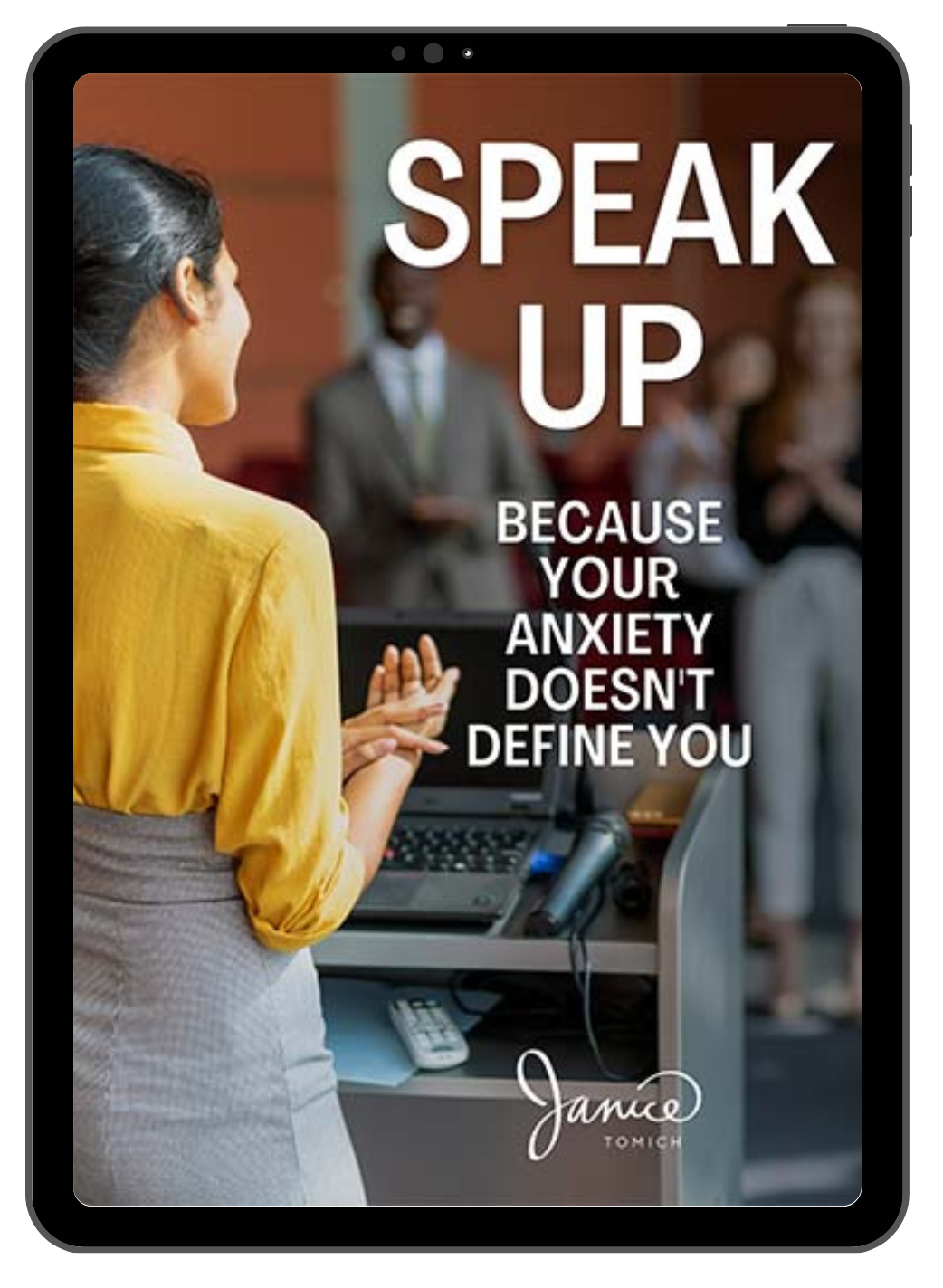I’m a public speaking coach, and I know that for a lot of people (including those you think look cool and composed on stage) the thought of public speaking creates a surge in anxiety levels. That anxious feeling is daunting because the out-of-control emotional rollercoaster usually overrides logic. Learning how to calm yourself down before a speech or presentation is an essential skill.
When you don’t have the ability to calm yourself or manage your emotions it can stop you from volunteering to deliver a presentation (pass by an opportunity to be seen) or the reason for not sleeping well nights before the day you’re scheduled to be on stage.
Presentation anxiety is an issue that clients often reach out to me for because having the ability to deliver presentations and communicate confidently is a skill that’s in high demand. It’s important that their ideas are heard. Direct reports look for strong public speaking and communication skills in their teams because it’s crucial to organizations that persuade and influence others without worrying they’ll be racked with anxiety.
Some of my clients described the anxiety as feeling weirdly outside of their body … out of touch with reality and as an outside observer looking at themselves. Their stressed out monkey mind takes control and they can’t figure out how to get out of the anxiety loop.
Presentation anxiety can manifest in other ways such as excessive sweating, shaking or trembling, an octopus of knots in your stomach, or even nausea. It’s no fun when you waste time feeling the fear of public speaking before and during a presentation.
The bad news is when you’re on stage and feeling anxious it can have serious impact. So much so that your mind goes blank because your amygdala has been hijacked.
The good news is presentation anxiety (usually) can be managed. Just like anything else you learn and get better at, the tools and techniques can be worked through, however as always the caveat is they need dedication to a consistent practice.
Investing your time to deliver presentations confidently is well worth the time compared to what happens to your career growth when you pass off presentations to your colleagues or decline speaking opportunities.
Table of Contents
How Common Is Presentation Anxiety?
Public speaking anxiety can be managed. You can’t entirely get rid of it, however there are tools and techniques to dampen down the anxiety and regulate it so you’re able to deliver speeches and presentations confidently.
The National Institute of Mental Health reports that 73% of us humans are affected by public speaking anxiety. The primary reason that the anxiety happens is because we fear being judged by others.
Many of the people you see that speak at events have some degree of a fear of public speaking but they have learned how to tame their anxiety. Even to the point they enjoy delivering presentations.
So, many people experience presentation anxiety…how will you tame your own nerves?
It is possible for most anyone to enjoy public speaking. Once you’ve managed your anxiety and delivered a presentation that you’re proud of there is an energy that happens when you connect with your audience and you’ll find you’ll want to invite more speaking opportunities because of the rush you get.
(info on public speaking coaching package)
Steps To Manage Presentation Anxiety
Awareness
Anxiety is fueled by the chattering, negative monkey brain that’s telling you stories that aren’t true such as, “this presentation is going to fall flat or what business do I have presenting?”
Please know that the whiley monkey is lying to you.
Getting rid of the monkey takes reeling your mind back and asking what’s really going on – figuring out what you’re believing that’s sabotaging your confidence. Then notice what you’re feeling. The feeling piece takes practice and patience because you need to slow down and listen.
If you’ve spent years ignoring what triggers you it’s going to take some time and investigation to go inside and listen to what your emotions/feelings are telling you.
The next step is acknowledging what you’re feeling and then letting it go. This visual works well: Visualize a nasty little gremlin on your shoulder that’s chattering away at you. Listen to it, thank it, and then in your mind’s eye make them dissolve/disappear. Give them a swat and send them on their way. To manage presentation anxiety take the time to go through each step – it’s is important to stop what fuels it.
Without taking the time to learn where your anxiety is coming from you’ll have a difficulty managing public speaking anxiety. Or you might find that you’re doing okay and then for no reason – out of the blue – get bitten by it.
It’s Not About You
It’s about your audience…what’s in it for them.

To help shift the spotlight off of yourself consider how your presentation will help your audience. Think too about why you’re grateful to be the person to deliver the message. How are you being of service?
By taking the focus off of yourself and realizing that you are delivering a presentation to educate or provide a service/product to help others, your mindset shift will tame your anxiety. It’s because you’ve moved the spotlight off yourself and focussed it on your audience. From this perspective there is no/little room for you to experience anxiety.
Pro Tip: You may think your anxiety or nervousness is obvious to others. It’s usually not. I’ve been privy to many conversations where the speaker shared they had been really anxious and thought they were obviously nervous. They are usually surprised to hear that no one could tell.
Carefully Plan And Prepare Your Presentation
It’s key that in the first stages of getting ready for your presentation you understand why you’re giving it. It’s how you will really understand if you have been successful (or not) and will help you get a good foundation of what your audience wants and needs to hear from you.
You are an expert in what you’re presenting. Your audience is not. Be cautious about bombarding your audience with too much information. Take your subject matter expert hat off and think back to when you were learning your craft or the gaps of knowledge that your expertise fills. Keep it simple and stick to the facts.
I’ve built a framework to create and develop presentations that are simple and focussed. You can access it here. My framework works well to stop audience overwhelm, so you don’t build in extra concepts that will confuse and lose your audience.
Practice Deep Breathing

Most adults don’t know how to take a deep breath. When asked they think they do but can only take a breath from their upper chest. Their breathing is constricted. It’s been a habit that’s built over lots of years.
Have you watched a young child or a baby breathe when they’re sleeping? Their lower belly expands and contracts as they breathe. That’s what you’re aiming for.
Are you skeptical about how well deep breathing works to calm nerves? You’ll find this article and this one that is proven research. Or prove it to yourself. If you have a smartwatch that records your heartbeat take a number of deep breaths and watch your heart rate go down. It’s magic how well deep breathing works to regulate nerves and anxiety.
If you find taking deep breaths difficult to master (you’re an upper chest breather) this explainer video will help you visualize the mechanics of deep breathing.
I encourage you to do a round of two to three deep breaths each time you practice your presentation. And do a few rounds just before your presentation. And set an alert on your phone or watch for a few times a day. Check in. Are you taking deep breaths?
Deep breathing is a worthwhile exercise to master. You’ll feel calmer for it.
(info on public speaking coaching package)
Turn Nervousness Into Positive Energy
There is a close connection to nervousness and excitement and reframing will change your perspective and tame your anxiety.
Have you noticed that sometimes you tell yourself stories that aren’t true? Stories such as my colleagues won’t value what I’m sharing (they already know what I know) or there are people that know more about what I’m speaking about than I do. These types of stories breed anxiousness.
Research tells us that by flipping the switch and using the word excited instead of negative ones will make us feel positive.
There is a connection between words/thoughts that make us feel anxious and those that make us feel positive.
The next time your thinking is going down a negative path, change your wording to excitement, which will change your perspective to a positive one.
Practice Your Presentation

Practicing just until you’re confident that you have learned your presentation will ease your public speaking anxiety. You’ll notice that I used the word learned and not memorized.
Memorizing your presentation will fuel anxiety. It’s too time consuming and tedious to learn your presentation word for word. And when you’re practicing or delivering your speech if you forget your place or even one word you have set yourself up for trouble. Which will reflect badly on your delivery and cause more anxiety. It’s too much pressure!
You’re better served to memorize your outline and then riff/expand off of your points. The result will be a presentation that comes off as being natural and you will be more comfortable delivering it.
Only practice until you are tired of practicing and of hearing your voice. You might have a few rough spots and rather than practicing your presentation in its entirety simply practice those.
It’s by knowing your presentation well that you’ll manage any anxiety that bubbles up.
Visualize Your Success
Elite athletes ‘watch’ themselves driving the ball onto the green or scoring goals. It’s from this type of positive perspective that you’ll create a feeling of comfort and ease – watching from the theatre of your mind deliver your presentation.
Taking yourself through the actions of getting ready, arriving on the stage, delivering, and taking in the applause. Key though is you’re not only watching your success. You need to also feel success too.
Feel Your Feet On The Ground

Try this quick tip just as you are about to deliver your presentation ground yourself by feeling your feet on the ground. This is a mindfulness technique that will pull you to the present rather than letting your monkey mind sabotage you with anxiety.
Interrupt Your Anxiety While On Stage
Did you know that Steve Jobs practiced Apple new product rollouts for months and months before the conference events? He meticulously practiced for what could go wrong and had a Plan B down to every detail. Do the same by giving thought to what you will do if your technology doesn’t work so you’re not caught without your Plan B if technology doesn’t go as planned.
Speaking too quickly and not really feeling the depth of your words can accelerate your nerves. Take your time, breathe, and give your words time to land by using pauses. You’ll notice that your audience will find it easier to get your point and the connection that happens when you’re on the same wavelength as your audience.
If you find yourself going blank and unable to remember what you wanted to speak to next buy yourself time by taking a few sips of water or referring to your notes. No one except you will realize that you’re gathering your thoughts.
If you’re lost and unsure about how to make your presentation compelling, I can help.
Give more presentations

When I returned to university as a mature student and struggled with a fear of public speaking I was determined to put it behind me. I made a point of volunteering for every opportunity I had to present to my cohort. It was naive because there is a foundation of skills that go hand and hand with practicing and raising your hand to every opportunity.
Your presentation skills do get better with the more presentations you give. Presentation anxiety diminishes when you have experience successfully managing your anxiety, which builds confidence for the next one and so on.
Performance Anxiety (Stage Fright) Disclaimer
Please seek medical support if you have severe performance anxiety.
If the techniques described above don’t make a difference to your anxiety level consider speaking with a medical professional. A medical professional can help with stage fright using cognitive behaviour techniques and by prescribing medications such as propranolol, which will slow down your heart rate and block adrenaline surges.
I encourage you to reach out for help from your medical provider if your anxiety is severe.
Most presentation anxiety can be managed so that you can deliver a presentation that is well received. It takes techniques such as shifting mindset, deep breathing to regulate your emotions, and practicing with the right focus. Managing presentation anxiety is doable and even better a goal that’s worthwhile.



